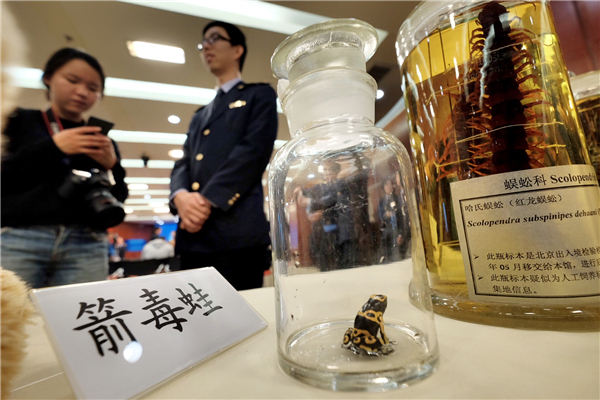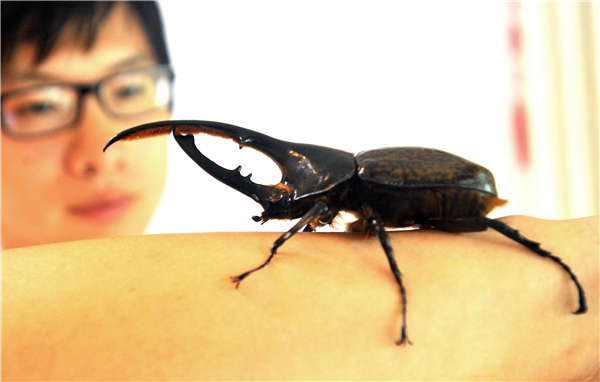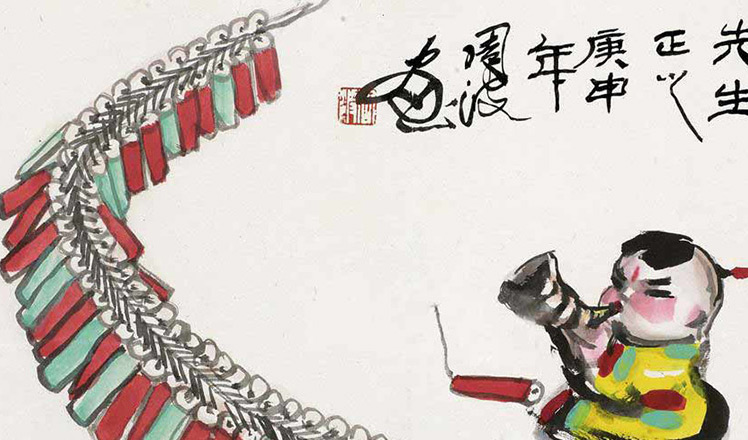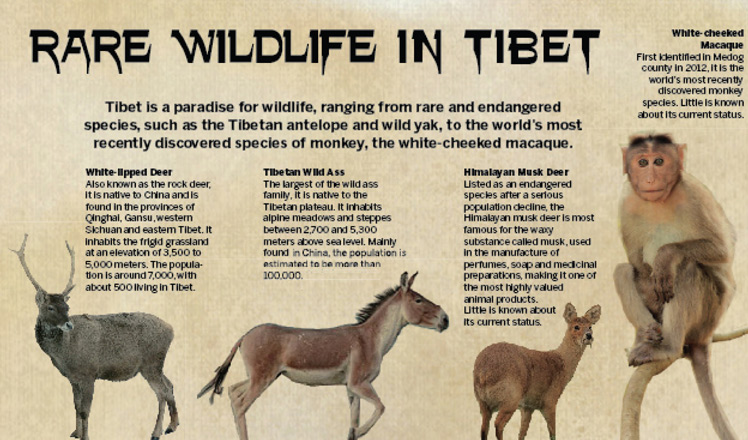The Internet invasion that's threatening China's eco-system
Updated: 2016-01-14 09:31
(China Daily)
|
||||||||
 |
|
A confiscated Phantasmal poison frog is displayed by the Beijing Entry-Exit Inspection and Quarantine Bureau alongside other prohibited items. YU XIAO/CHINA DAILY |
China is the world's biggest e-commerce market, accounting for about 40 percent of the world's online trade. That market is set reach $1 trillion by 2019, according to a report published by Forrester Research, an independent technology monitor.
However, while the growth of online transactions has provided many benefits, it also has many downsides, including one that is exacerbating one of the biggest challenges facing the country's environmental integrity-the rise of invasive alien species.
Every year, non-native species are entering the country in increasing numbers. Some arrive in air and maritime freight, but more and more are being brought into the country illegally via online transactions, causing economic losses and widespread environmental damage by driving native species from their habitats and in some case even wiping them out.
At the last count, there were 544 invasive alien species in China, 50 of which are considered the most dangerous in the world. Their presence results in direct economic losses of 57.4 billion yuan ($8.7 billion) every year.
Tighter regulations
The problem has now become so pressing that new guidelines were enacted on Jan 1, designed to strengthen supervision of cross-border e-commerce. The new rules, which were published by the General Administration of Quality Supervision, Inspection and Quarantine in July, include a series of measures that require inspection and quarantine authorities at all levels to set up files on online stores and build a traceability system for products that pose potential safety risks.
"The introduction of alien species is accelerating. In the past, we only discovered one or two in China every 10 years, but in the past decade, one or two have appeared every year," said Liu Wanxue, a researcher from the Institute of Plant Protection at the Chinese Academy of Agricultural Sciences, in an interview with the Lanzhou Morning Post.
According to data published by the administration, customs officials intercepted and impounded 980,000 harmful aliens from 5,788 different species last year. The inspection and quarantine authorities intercepted overseas deliveries that contained a wide range of alien species, including beetles, scorpions, lizards and snakes. Most had been purchased online by domestic buyers as pets.
In March, the Xiamen Customs spotted four Phantasmal poison frogs in a delivery from Hong Kong. Each frog was capable of producing enough venom to kill 20,000 mice, according to local media reports.
In July, the Nanning Customs in the Guangxi Zhuang autonomous region found 80 cockroaches of six different species that had been bought at an online pet store for about around 8 yuan ($1.22) each.
In November, the customs house in Beijing discovered 992 non-native ants in a delivery of glass test tubes from Germany. The test tubes contained enough syrup and water to ensure the ants survived the journey.
"Alien species are introduced by foreign trade, transportation tools, baggage and mailed items," said Huang Honghui, director of the Animal Inspection and Quarantine Department at the Hainan Entry-Exit Inspection and Quarantine Bureau.
"The rapid development of cross-border e-commerce is increasing the risk of invasion by alien species, and this is putting greater pressure on the inspection process," he said.
Last year, a number of custom houses in China established blacklists containing details of the illegal traffic of alien species and included the names and addresses of senders and recipients. In future, all transactions between the named parties will be subject to increased scrutiny
"The ultimate way to solve the problem is to strengthen publicity of the risks posed by these alien species to raise public awareness," Huang said.
 |
|
A resident of Qingdao, Shandong province, allows his hercules beetle to crawl on his arm. The huge beetle is native to South America. CHINA DAILY |
- A glimpse of Spring Rush: little migrant birds on the way home
- Policy puts focus on genuine artistic students
- Police unravel market where babies are bought, sold as commodities
- More older pregnant women expected
- Netizen backlash 'ugly' Spring Festival Gala mascot
- China builds Mongolian language corpus
- 2 Chinese nationals killed, 1 injured in suspected bomb attack in Laos
- New York, Washington clean up after fatal blizzard
- 'Plane wreckage' found in Thailand fuels talk of missing Malaysian jet
- Washington shuts down govt, NY rebounds after blizzard
- 7 policemen, 3 civilians killed in Egypt's Giza blast
- Former US Marine held in Iran arrives home after swap

 Drone makers see soaring growth but dark clouds circle industry
Drone makers see soaring growth but dark clouds circle industry China's Zhang reaches Australian Open quarterfinals
China's Zhang reaches Australian Open quarterfinals
 Spring Festival in the eyes of Chinese painters
Spring Festival in the eyes of Chinese painters
 Cold snap brings joy and beauty to south China
Cold snap brings joy and beauty to south China
 The making of China Daily's Tibetan-style English font
The making of China Daily's Tibetan-style English font
 First trains of Spring Festival travel depart around China
First trains of Spring Festival travel depart around China
 Dough figurines of Monkey King welcome the New Year
Dough figurines of Monkey King welcome the New Year
 Ning Zetao, Liu Hong named China's athletes of the year
Ning Zetao, Liu Hong named China's athletes of the year
Most Viewed
Editor's Picks

|

|

|

|

|

|
Today's Top News
National Art Museum showing 400 puppets in new exhibition
Finest Chinese porcelains expected to fetch over $28 million
Monkey portraits by Chinese ink painting masters
Beijing's movie fans in for new experience
Obama to deliver final State of the Union speech
Shooting rampage at US social services agency leaves 14 dead
Chinese bargain hunters are changing the retail game
Chinese president arrives in Turkey for G20 summit
US Weekly

|

|








